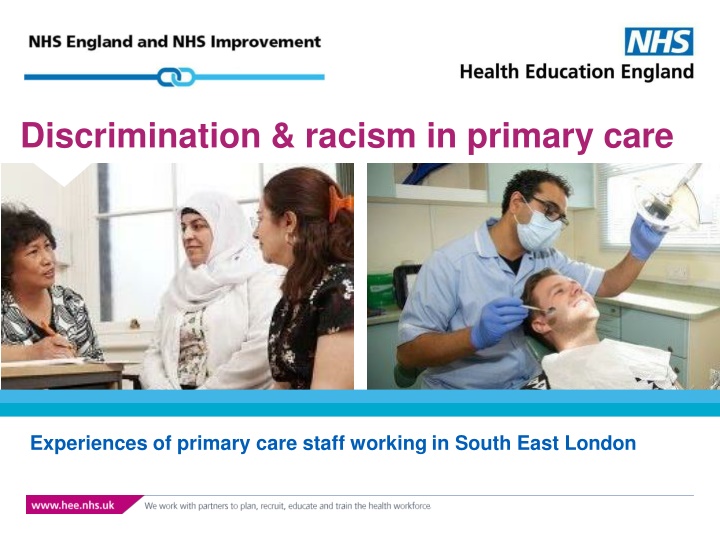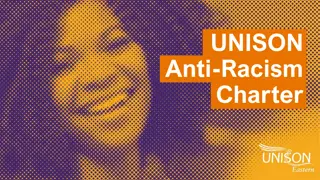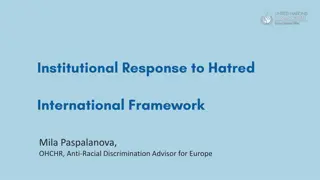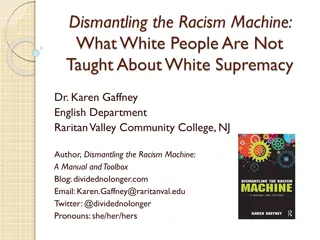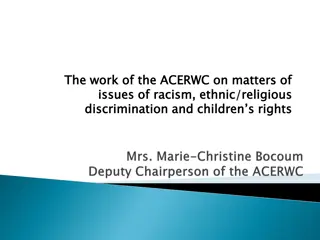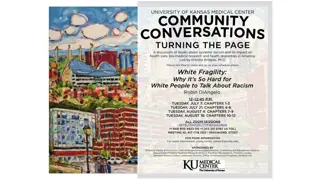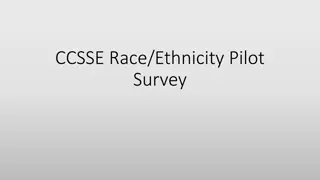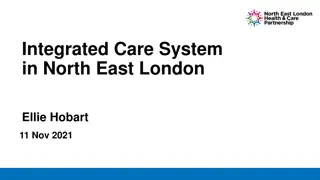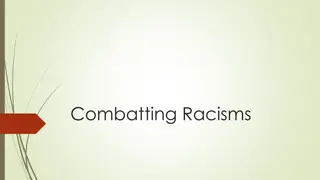Experiences of Discrimination and Racism in Primary Care among South East London Staff
A pan-London survey was conducted to explore discrimination and racism experiences among primary care staff. 244 respondents from South East London participated, representing various roles and demographics. The survey aimed to ensure a safe and inclusive work environment.
Download Presentation

Please find below an Image/Link to download the presentation.
The content on the website is provided AS IS for your information and personal use only. It may not be sold, licensed, or shared on other websites without obtaining consent from the author.If you encounter any issues during the download, it is possible that the publisher has removed the file from their server.
You are allowed to download the files provided on this website for personal or commercial use, subject to the condition that they are used lawfully. All files are the property of their respective owners.
The content on the website is provided AS IS for your information and personal use only. It may not be sold, licensed, or shared on other websites without obtaining consent from the author.
E N D
Presentation Transcript
Discrimination & racism in primary care Experiences of primary care staff working in South East London
Pioneering pan-London survey All NHS staff deserve to work in an environment that is safe, welcoming and free of discrimination. In November/December 2021 all primary care staff in London were invited to complete a short anonymous online survey to say whether or not they had experienced discrimination at work over the past 12 months. The survey was advertised in meetings, newsletters, social media, mailing lists and through HEE, NHSEI, Primary Care School, LMC, LPC, LDC, ICSs, PCNs, Training Hubs, EDI leads, PM Fora and networks. This document sets out the feedback from South East London.
Who shared their experiences? 1025 primary care team members from across London took part. 244 people worked in South East London. North Central London 176 North East London 286 North West London 134 South East London 244 South West London 181
Who shared their experiences? The roles of the 244 people responding from South East London are below. This represents about 6% of the primary care workforce in South East London. GP - salaried, partner or locum 27% General practice nurse or ANP 17% Practice Manager 14% Administrative, clerical, reception or IT roles 20% Other senior management roles e.g finance 3% Optometrist, optician, optical assistant 6% Pharmacist, pharmacy technician 2% Dentist, dental nurse or other clinical dental 1% Other supporting clinical roles e.g. HCA Other patient care roles e.g. health coach 4% 3% Other roles e.g. student 1%
Who shared their experiences? The age, gender and ethnicity profile of the 244 people who took part in South East London was broadly representative of the primary care workforce in the area. 42% Non- binary and other 1% Female 78% 27% 20% 6% 4% Male 21% 1% 16-20 21-30 31-40 41-50 51-65 66+ yrs
Who shared their experiences? Asian/Asian British - Indian 12% Asian/Asian British - Pakistani 3% Asian/Asian British - Bangladeshi Asian/Asian British - Chinese 3% 1% Other Asian/Asian British 3% 11% Black/Black British - African Black/Black British - Caribbean Other Black/Black British 8% 1% 40% White - British White - Irish 2% Any other White background 9% Arab 1% Any other background 8%
Discrimination and harassment Below are the proportions who said they had experienced discrimination or harassment due to their personal characteristics in their primary care work in the past 12 months. 47% said they experienced some type of discrimination. 18% Due to ethnicity 33% 4% Due to gender 13% 5% Due to age 6% 3% Due to religion 4% 1% Due to disability 2% 1% 1% Due to sexual orientation Discrimination from staff Discrimination from patients 2% 2% Due to other characteristics
Perceived racial discrimination Below are the proportions of people from different ethnic backgrounds who said they had personally experienced racial discrimination or harassment at work in the last 12 months. Discriminated against by patients 33% 55% 60% 11% 33% 30% Discriminated against by staff 18% 20% 40% 6% 10% 35% Ethnic background Total, all ethnic groups Asian or Asian British Black or Black British White British or Irish Any other White background Any other background
Racial discrimination - past year People from minority ethnic backgrounds were more likely to feel their ethnicity had reduced their career progression and training opportunities in the past year. % Asian % Black % White British / Irish % Other White % Any other 86 78 76 70 59 50 40 30 29 30 25 25 22 18 17 10 10 5 3 3 My organistion acted fairly about promotions and progression, regardless of ethnicity My ethnicity reduced my chances of promotion or progression My ethnicity reduced my opportunities for training I saw a colleague discriminated against due to their ethnicity
Racial discrimination past year People from minority ethnic backgrounds were more likely to say that they considered leaving their role due to racial discrimination in the past year. % Asian % Black % White British / Irish % Other White % Any other 36 33 22 22 21 20 18 14 14 14 11 10 9 6 6 6 5 3 2 1 0 0 0 0 0 Senior colleague Patient complained Colleague complained about me due to my ethnicity Had performance measures or disciplinary action due to my ethnicity Considered leaving or left due to racial discrimination discriminated against me due to my ethnicity about me due to my ethnicity
Impacts of racial discrimination 91 people shared a recent experience of perceived discrimination or harassment based on their ethnic background. Most said that the most recent instance involved subtle or underhanded comments or actions. Examples of perceived discrimination included: Subtle or underhand comments or actions, 64% racial slurs / stereotyping being undermined or put down not being listened to, treated with respect or promoted patients wanting to see someone else Direct comments or actions, 26% People said this led them to: feel undervalued, unsupported, demoralised have significant mental health concerns leave the job or go on sick leave Aggressive or threatening behaviour, 10%
Examples of discrimination Worked through the whole COVID crisis, only to be called for disciplinary action for breach of COVID rules 3 months after the event. Just used me to keep offering services. I won my case but I have never felt so demoralised and unappreciated in my life. I would rather go drive a HGV than do this job right now. Seeing that l was being treated differently compared to my colleagues made me feel as if my feelings and opinions were not worthy. Discrimination makes me feel worthless and sad that I have given so much yet not appreciated. White bureaucrats discriminate and they harass you into feeling that you are not doing a good job. Colleagues say things and act towards you in a discriminative way. You do not feel like interacting with that person anymore or even speaking to them. This does not help team morale nor does it lighten the atmosphere to make the work an enjoyable experience.
Reporting racial discrimination Of the 91 people who described their experiences of racial discrimination, 41% said they or someone else reported the most recent incident. About 1 in 7 said they reported it and it was dealt with well. 15% I reported and it was dealt with well 22% I reported but not dealt with well Someone else reported 4% 47% Did not report as thought nothing would be done Did not report as worried about consequences 29% Did not report as did not know who to report to 19% 7% Dealt with issue directly with person People could give more than one reason for not reporting 2% Did not feel the need to report
Do people know what to do? Regardless of whether they experienced discrimination, we asked if people knew where to get help with ANY harassment or discrimination at work. Many said they knew where to go for help, but people from minority ethnic backgrounds were least likely to feel confident that anything would be done. % Asian % Black % White British/ Irish % Other White % Any other 94 92 91 86 81 81 80 76 75 69 68 65 61 47 39 I know where to go for help to deal with any harassment or discrimination I see or experience at work I would feel secure raising concerns about harassment or discrimination where I work I am confident that my organisation would address concerns I raise about harassment or discrimination
What are the top priorities? 61 people suggested practical things to tackle racial discrimination or harassment (regardless of whether they had experienced any): Training for all staff about diversity and unconscious bias (33%) and helping people feel confident to raise and deal with issues (7%) Zero tolerance campaign, informing patients about what is unacceptable and making it easy to remove patients from the register (25%) Independent body to investigate and support, including advice helpline and anonymous reporting (18%) Safe spaces to discuss and report issues, including meetings, website forum and regular surveys like this (16%) Recruiting diverse people to (senior) roles and setting diversity targets (13%) Standardised policy and protocols for responding (10%) and more promotion of the process for reporting and getting support (7%)
What are the top priorities? I think the current political culture has worsened the situation as the rhetoric is so hostile to anyone who isn't viewed as being British. I think a change of culture needs to come from the top - RCGP, BMA etc & be publicised repeatedly in the media. The main issue is to listen and support our colleagues as the hurt and offence that we all experience can only be healed by the support we receive from our peers. Minorities to be empowered to call out racism, discrimination, harassment and bias via a government led agency who can feed back to companies then we would know the true scale of the problem. Minorities don't often report or log racial offences because they are afraid of losing their job. White staff to acknowledge that they have a culture and to explore what it is and realise the word is not exclusively for minorities. Having an easy way of staff doing anonymous surveys which could then be fed back to us by an independent body anonymously so we pick up issues that have not surfaced.
What have we learnt? 47% of people responding from South East London said they had experienced some type of discrimination or harassment due to their personal characteristics at work last year. 33% said they experienced racial harassment or discrimination from patients and 18% from colleagues or managers. 41% of recent instances of racial discrimination were reported, but only 15% said they reported it and the issue was dealt with well. Black people were more likely than others to say they had experienced racial discrimination, but were less likely to know where to get help and less likely to feel confident about raising issues. The most common suggestions to help address racism at work were training for all team members, a zero tolerance campaign targeting patients and an independent group to give advice and investigate.
